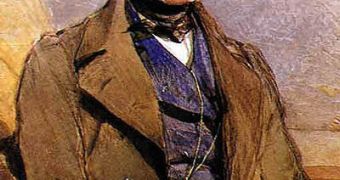Much is known about Charles Darwin's voyages around the world, and of his work later on in life, when he wrote his famous evolution theories. However, little has been revealed thus far about his early years, especially the time when he was a student at the famed Christ's College, from 1828 to 1831. A stack of bills, discovered at the Cambridge University, now comes to shed some light on the English naturalist's early life, which seems to have been one fit for a genuine gentleman.
According to the paper, Darwin paid extra money to the institution to have vegetables with each of his meals, a thing that wasn't customary at that time, when many people ate and drank heavily.
The then-student also kept regular tabs with a bed-maker, to help him clean up his rooms, as well as with a shoe-polisher and a coal man. The latter received money to bring coal right up to Darwin's room, so that the young gentleman wouldn't have to get his hands dirty.
“Thanks to the discovery, historians now have the exact date of Darwin's arrival at the university – January 26th, 1828 – as well as a huge assortment of details which will enable them to reconstruct his undergraduate life as never before,” a spokesman for the university said, and added that the six record books that had been recovered would be published online for everyone to see.
“The books show how Darwin enjoyed all the trappings one would expect of a 19th century gentleman, paying service-people to carry out tasks such as stoking his fire and polishing his shoes. They even reveal that he was a stickler for his five-a-day, paying extra for vegetables at college meals,” the same source shared. “Darwin famously spent little of his time at Cambridge studying or in lectures, preferring to shoot, ride and collect beetles.”
Still, after his time at the university, Charles Darwin would set out to become the most influential man of his time, traveling around the world and observing the wildlife in unprecedented detail. Then, one day, he would get the idea that animals were evolving from generation to generation, towards more advanced forms of themselves, and that the weaker ones were simply expelled from existence by nature itself.
This work was to become one of the most acclaimed and criticized books in history, sparking controversies between what would later become known as the creationist and the evolutionist groups that still rage today.

 14 DAY TRIAL //
14 DAY TRIAL //